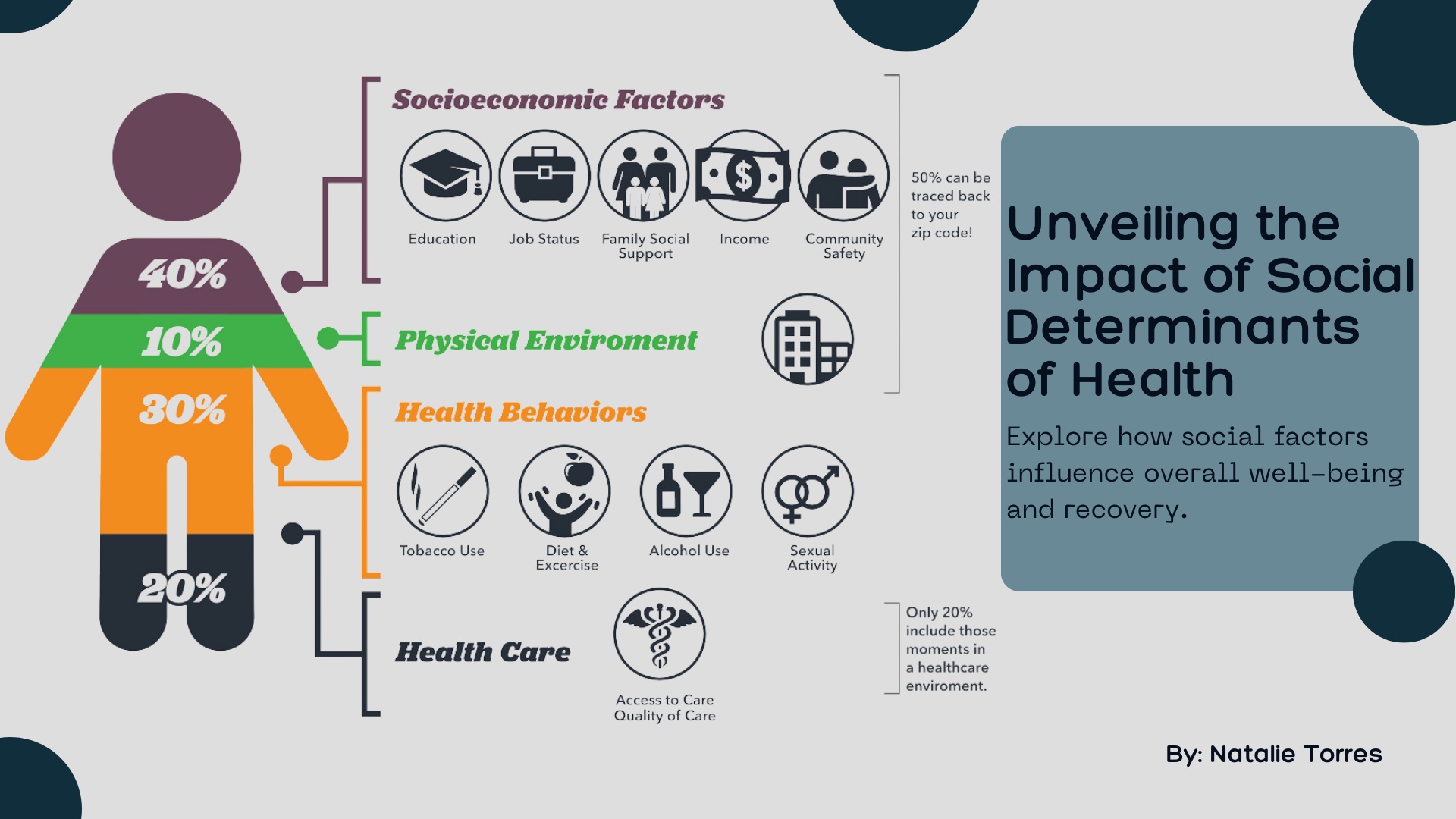Share This Article:

Understanding the Social Determinants of Health in Worker Recovery: A Guide for Insurance Professionals and Attorneys
29 Jul, 2024 Natalie Torres

In the realm of workers' compensation, the road to recovery for injured individuals is often paved with complexities that extend far beyond physical healing. While medical treatment plays a crucial role in rehabilitation, the social determinants of health (SDOH) wield significant influence over an individual's ability to recover and return to work. In this article, we will explore what SDOH are, how to identify them, their impact on worker recovery within the compensation system, and how service providers and healers can better support individuals by addressing these determinants.
What are Social Determinants of Health?
SDOH are the conditions in which people are born, grow, live, work, and age that shape their health outcomes. These determinants include factors such as socioeconomic status, education, employment, social support networks, physical environment, and access to healthcare services. Research has shown that these non-medical factors can significantly influence an individual's overall health and well-being.
Identifying Social Determinants of Health
Recognizing the various SDOH affecting an injured worker requires a comprehensive assessment that extends beyond medical records. Insurance professionals and attorneys should consider conducting interviews with the injured individual to gather information about their living conditions, employment history, social support systems, and financial situation. Additionally, utilizing community resources and collaborating with social workers can provide valuable insights into the broader context of an individual's life.
Impact on Recovery in the Workers' Compensation System
The influence of SDOH on worker recovery cannot be overstated. Individuals facing socioeconomic challenges such as unstable housing, financial insecurity, or lack of access to transportation may struggle to adhere to treatment plans, attend medical appointments, or afford necessary medications. Additionally, stressors related to work environment, job dissatisfaction, or lack of social support can impede progress and prolong recovery timelines.
Supporting Recovery Through Understanding
As service providers and healers within the workers' compensation system, it is imperative to address the SDOH impacting injured workers to facilitate optimal recovery outcomes. This involves adopting a holistic approach that goes beyond medical interventions to address the root causes of health disparities. Here are some strategies to consider:
1. Holistic Assessment: Conduct thorough assessments that encompass both medical and social factors to gain a comprehensive understanding of an individual's needs.
2. Collaborative Care: Foster collaboration among medical professionals, social workers, legal representatives, and community organizations to provide integrated support services tailored to the individual's circumstances.
3. Advocacy: Advocate for policies and initiatives that address systemic barriers to health equity, such as affordable housing, living wages, and access to quality education and healthcare.
4. Empowerment: Empower injured workers by involving them in decision-making processes, providing education on their rights and available resources, and offering opportunities for skill-building and employment reintegration.
The Path to Recovery
The social determinants of health play a significant role in shaping the recovery journey of injured workers within the compensation system. By acknowledging and addressing these determinants, insurance professionals and attorneys can better support individuals on their path to recovery, ultimately promoting positive health outcomes and enhancing overall well-being. Embracing a holistic approach that prioritizes social justice and equity is essential in achieving true healing and rehabilitation for all.
california case management case management focus claims compensability compliance courts covid do you know the rule emotions exclusive remedy florida FMLA fraud glossary check health care Healthcare hr homeroom insurance insurers iowa leadership medical NCCI new jersey new york ohio osha pennsylvania roadmap Safety state info technology texas violence WDYT west virginia what do you think women's history women's history month workcompcollege workers' comp 101 workers' recovery Workplace Safety Workplace Violence
Read Also
About The Author
About The Author
- Natalie Torres
More by This Author
Read More
- Apr 18, 2025
- Kristin Green
- Apr 15, 2025
- Anne Stanco
- Apr 14, 2025
- Natalie Torres
- Apr 13, 2025
- Edward Stern
- Apr 08, 2025
- Frank Ferreri
- Apr 07, 2025
- Natalie Torres




